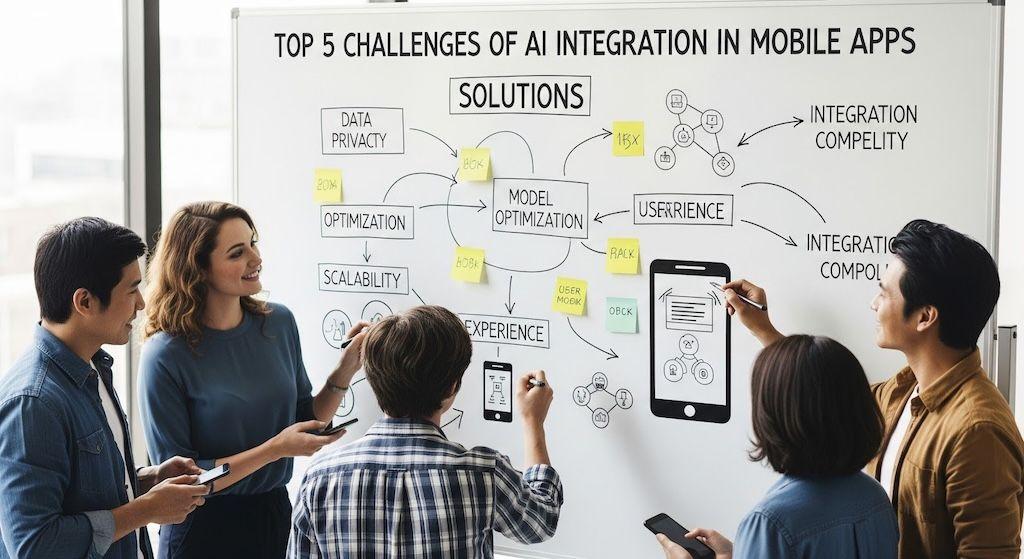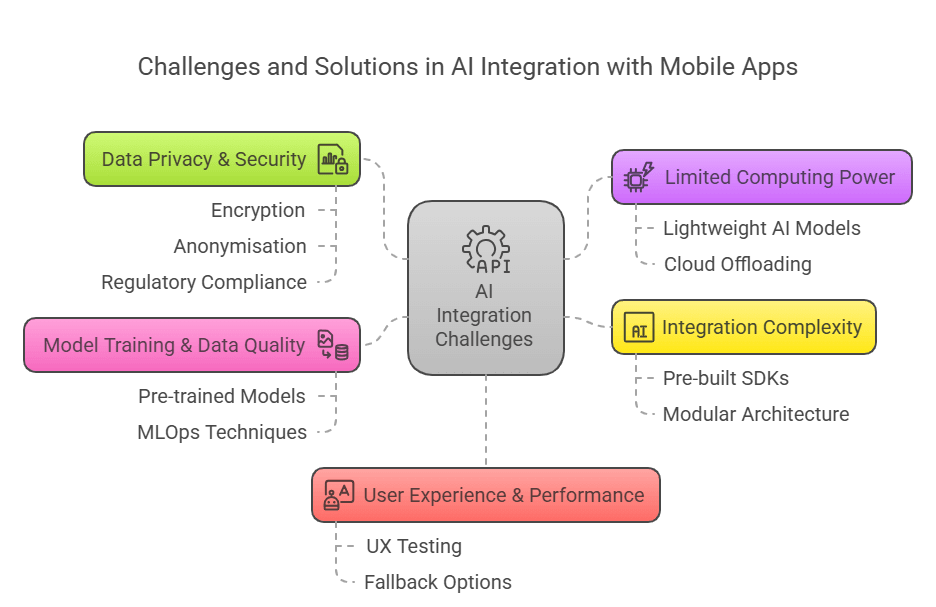Overcoming the Top 5 Challenges of AI Integration in Mobile Apps

Key Takeaways
- AI integration in mobile apps enhances personalisation, automation, prediction, and security, driving innovation and boosting user engagement.
- Top challenges include data privacy, limited device computing power, integration complexity, poor data quality, and user experience trade-offs.
- Data protection solutions involve encryption, anonymisation, on-device processing, and compliance with regulations like GDPR and HIPAA.
- Optimised models like TensorFlow Lite and cloud-edge hybrid processing help overcome device performance constraints.
- Modular architectures and pre-built AI APIs simplify integration, while MLOps ensures continuous improvement in model performance.
- User trust and engagement require clear opt-ins, UX testing, fallback features, and transparent AI use explanations.
- Choosing the right AI partner is critical—ensuring scalable, secure, and future-ready AI integration tailored to your app's architecture.
Introduction
With its power to reshape business strategies, artificial intelligence (AI) is emerging as the new cornerstone of mobile app development. As AI continues to dynamically evolve, its integration into mobile apps isn’t just a technological upgrade. It’s a game-changer that’s driving innovation and setting new standards for what users expect from their mobile experiences.
For example, it’s pushing the technological boundaries of mobile apps in terms of personalisation, automation, and prediction. Thereby, increasing customer retention and satisfaction.
Despite AI's enormous potential, app developers still face a slew of obstacles when incorporating AI into mobile apps. For example, maintaining algorithm correctness, protecting user privacy, managing limited processing power, and guaranteeing interoperability across a variety of devices.
This informational article seeks to delve deeper into these challenges. More importantly, it aims to offer practical and actionable solutions that deliver smooth AI-powered experiences.
Benefits of AI integration in mobile apps
AI transforms mobile apps into smarter, more efficient, and user-centric platforms that stand out in a competitive digital landscape. AI business integration in mobile apps, therefore, offers several appreciable benefits, such as:
- Hyperpersonalized user experiences: By leveraging AI to monitor user behaviour, organisations can deliver real-time, adaptive, and customised interfaces, content, and recommendations. Thus, making every interaction interesting and one-of-a-kind.
- Task automation: AI saves valuable time and lowers operating costs by automating complicated and repetitive jobs. For instance, customer service through chatbots or intelligent responses.
- Predictive capabilities: AI integration appreciably improves user satisfaction and app efficiency by utilising data to predict user needs and recommend pertinent content.
- Augmented security: AI fortifies app security by exploiting sophisticated features like biometric authentication, fraud detection, and real-time threat monitoring
- Enhanced user engagement: AI augments user engagement and increases retention rates in a crowded market by powering context-aware features and adaptive interfaces.
For further reading, check out: AI Integration with Mobile Apps: Comprehensive Guide.
Key challenges when integrating AI with mobile apps
 To fully exploit AI's disruptive potential, developers must overcome several challenges when integrating it with mobile apps. These impediments highlight the necessity of specialised knowledge and ongoing oversight when incorporating AI into mobile applications.
To fully exploit AI's disruptive potential, developers must overcome several challenges when integrating it with mobile apps. These impediments highlight the necessity of specialised knowledge and ongoing oversight when incorporating AI into mobile applications.
Data privacy & security concerns
Challenge: Mobile apps with AI capabilities natively depend on gathering and analysing large volumes of user data. This brings up important questions about security, user permission, data privacy, and adherence to national and international regulations. Data misuse can result in reputational harm, legal repercussions, and a detrimental decline in user confidence.
Solution: To allay these mobile security worries, developers must give security top priority from the outset. They should exploit state-of-the-art encryption and anonymisation protocols to safeguard data, both at rest and in transit. In practice, anonymisation and differential privacy techniques help lower the possibility of re-identification from datasets.
Strict adherence to laws such as GDPR, and HIPAA is also crucial. These regulatory frameworks impose stringent requirements that emphasise data transparency, user consent, and data minimisation. Thereby, building user trust and upholding ethical standards in mobile app development.
Lastly, when possible, employ on-device AI processing to increase privacy and performance while lowering the need for cloud infrastructure.
Limited computing power on mobile devices
Challenge: AI models, especially deep learning ones, necessitate high processing power. Compared to PCs or servers, mobile devices have substantially less memory and computational power. As such, when directly running deep-learning AI apps, the mobile user experience can be negatively impacted by slowness, battery consumption, and overheating.
Solution: Developers should consider leveraging lightweight AI models like MobileNet, TensorFlow Lite, or ONNX models. These optimised models are specifically designed to get around the hardware limitations inherent in modern mobile devices.
In practice, they are engineered to be computationally efficient, minimising memory usage, power consumption, and latency. This allows for real-time processing and decision-making directly on the device, without over-reliance on cloud infrastructure.
They should also consider offloading intensive tasks to the cloud in conjunction with edge computing techniques. This approach lowers latency for processing jobs that require more processing power.
Developers should also balance real-time processing needs with the capabilities of mobile devices to guarantee responsiveness without compromising functionality. They can achieve this by implementing efficient data synchronisation, caching, and compression methods to avoid overwhelming device resources.
Integration complexity
Challenge: When AI is added to an existing mobile app architecture, new components must be integrated or rearchitected. This can cause workflow disruptions and call for a high level of technical know-how. For example, the design of data pipelines, model deployment, and lifecycle management might all need re-architecting. This can be technically complex and time-consuming.
Solution: To overcome this challenge, consider exploiting pre-built SDKs and APIs from reputable platforms like OpenAI, IBM Watson, and Google ML Kit to reduce complexity. These tools make integration easier by managing a large portion of the AI infrastructure in the background.
AI components can also be easier to design, test, and maintain with a modular app architecture. Modularising involves breaking down the app into independent, self-contained modules, each handling specific functionalities. This greatly enhances flexibility, allowing developers to update, replace, or scale individual AI components without disrupting the entire system.
Last but not least—maybe most importantly—incorporate skilled AI engineers early on in the planning phase. This reduces the technical debt and makes it easier to foresee and handle architectural difficulties.
Model training and data quality
Challenge: The quality of the training data significantly impacts the effectiveness of AI models. Underperforming models may result from biased or subpar datasets. Additionally, training takes a lot of resources, and maintaining models over time can be logistically challenging.
Solution: Since managing the quality of training data and continuous updates can be difficult, several feasible solutions might suffice. For example, consider starting with pre-trained models and iteratively refining them using superior, domain-specific data.
Furthermore, create pipelines that continuously gather and categorise pertinent user data whilst guaranteeing user permission and privacy compliance. Additionally, automate the training, testing, and deployment of models by implementing MLOps (Machine Learning Operations) techniques. This will increase productivity and preserve model correctness over time.
User experience & performance trade-offs
Challenge: Artificial intelligence (AI) is seismically augmenting mobile app utility. However, it may be subject to error, delays, or unpredictable behaviour—particularly when network conditions or device limitations are involved. Consequently, users may become frustrated and lose faith in the app's functionality.
Solution: To mitigate such occurrences, ensure that a crucial component of the AI feature development cycle is user experience (UX) testing. Rigorous UX testing—powered by both traditional and AI-driven tools— allows developers to simulate real-world scenarios and identify nuanced usability issues across diverse devices and conditions.
This not only minimises the likelihood of negative outcomes but also supports continuous improvement as AI apps evolve.
Furthermore, provide fallback options in case AI features malfunction or perform poorly. For instance, switching to non-AI options. Additionally, be open and honest with users about the operation of AI features by providing them with explanations and opt-in options. This fosters user confidence in them.
Why choosing the best AI integration services matter for your mobile app?
AI integration services have a direct effect on the quality, dependability, and efficiency of the intelligent AI features within your proposed app. In fact, the selection process cannot be taken lightly in today’s ultra-competitive and evolving digital landscape.
High-quality AI integration services guarantee that your app will provide precise predictive insights, effective task automation, and sophisticated personalisation—all while preserving a flawless user experience and performance.
Building user trust requires strong security standards, adherence to data privacy laws, and access to the newest developments in AI technology. All these are perks you can get with knowledgeable and experienced AI partners.
Additionally, the state-of-the-art of AI is continually evolving and getting more complex, dictating continual education and competence. From identifying the best lightweight models to optimising for mobile contexts, the right AI integration provider can assist you in navigating the technical intricacies of integrating AI.
Lastly, many existing mobile app architectures are outdated and weren’t originally designed to accommodate modern AI capabilities. These antiquated systems often lack the modularity, scalability, or flexibility to incorporate advanced AI features without risking instability or performance issues.
Partnering with the right AI integration experts like Techies can significantly ease this burden by providing specialised knowledge and proven methodologies tailored to your app's unique architecture.
Our experienced developers are adept at transforming ideas into impactful user-centric products. They excel at simplifying complex AI integration processes and providing customised strategies that align with your app's current architecture.
Conclusion
AI is radically changing the mobile app landscape by enhancing its intelligence, usability, and personalisation capabilities. It is seismically transforming the way mobile applications communicate with users and provide value.
In fact, in healthcare, finance, and entertainment, AI-driven chatbots and virtual assistants are revolutionising user engagement and expediting customer service.
However, integrating AI into mobile apps still presents several systemic challenges. For example, safeguarding data privacy and security, managing limited computing power on devices, and navigating complex integration processes.
Even while these challenges complicate the adoption of AI, the correct techniques—like using optimised models, modularising app architecture, and emphasising user-centric design—can unlock immense value and innovation.
So, companies should not shy away from adopting AI. Rather, they should proceed with confidence, knowing the right partners exist to ease any fears.
If you’re looking to extend your mobile app development with AI capabilities, reach out for a consultation to achieve intelligent, reliable, and significant mobile experiences.
Remember, investment in AI produces quantifiable company growth and long-term success!
About Author
Kok Weng
Kok Weng Kong is a tech enthusiast and problem-solving expert with a passion for technology and innovation. As the Founder & CEO of Techies App Technologies Sdn. Bhd., he specializes in building beautiful web and mobile applications and providing branding and marketing solutions for businesses. With a background in Information Technology and extensive experience in the industry, Kok Weng Kong excels in creating innovative solutions for various tech challenges.

Digitizing businesses since 2017
© 2025 Techies | All rights reserved


